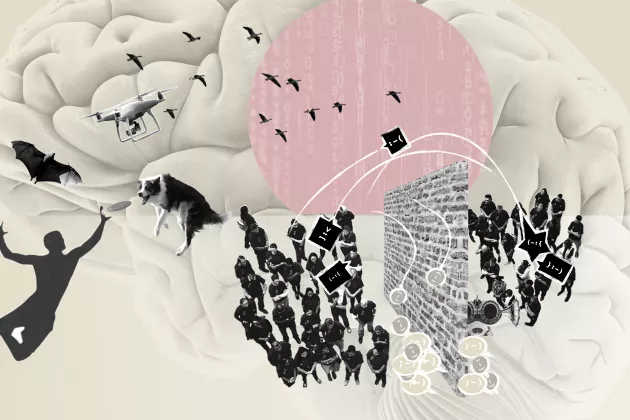Oct
Natural and Artificial Cognition II

Fika-to-fika Workshop about research on how aspects of human, animal, or artificial cognition, through communication and other forms of interaction, influence behaviour in the individual, dyadic, or collective context.
When: 24 October 09.30 – 15.30 (CET)
Where: E:A, E-huset, Ole Römers väg 3, Lund, Sweden and online
Registration
To participate is free of charge. Sign up for on-site or online participation at ai.lu.se/2023-10-24/registration/.
Registration for on-site participation will close on Monday 23 October at noon. Registration for online participation will close Tuesday afternoon.
Programme
9.30 Registration, posters, fika & mingle
9.55 Online meeting opens
10.00 Introduction and research presentations
Moderator: TBA
Online moderator: Melvyn B Davies
Introduction
Kalle Åström, Coordinator Natural and Artificial Cognition at Lund University
Invited talk: The Human-Machine Partnership for Biomedical Innovation (abstract)
Magnus Fontes, General Manager of Institut Roche in Paris, France (bio)
Dung beetle decisions: Why, where and when?
Marie Dacke, Professor, Functional zoology, Lund University
Silence – then thunder storms. Doing computational social science in polarizsed times
Robert Klemmensen, Professor, Political Science, Lund University
Midlevel Representations and Domain Specific Geometric Estimation in Computer Vision
Magnus Oskarsson, Senior lecturer, Mathematics, Lund University
12.00 Lunch and poster session
13.10 Online meeting opens
13.15 Research presentations
Moderator: Marianne Gullberg, Deputy Coordinator Natural and Artificial Cognition at Lund University
Online moderator: Melvyn B Davies
Invited talk: Nationella språkbanken: A tripoint in the academic landscape
Lars Borin, Director of Nationella språkbanken (the National Swedish Language Bank), national coordinator of Swe-Clarin and professor of natural language processing, University of Gothenburg.
How consciousness may rely on brain cells acting collectively – new psychedelics research on rats
Pär Halje, Assistant researcher, Integrative Neurophysiology, Lund University
From individual behaviour to global scale migrations in birds (abstract)
Susanne Åkesson, Professor, Evolutionary ecology, Lund University
Round up & conclusions
Kalle Åström, Coordinator Natural and Artificial Cognition at Lund University
15.00 Poster session fika and mingle
15.30 end of workshop
Posters
Boosting Public Waste Sorting
Anton Wrisberg, Cognitive Science, Lund University
Time-resolved representational similarity analysis reveals integrated and separated neural patterns of overlapping events
Zhenghao Liu, Psychology, Lund University
How pairs coordinate their travels towards unknown destinations
Claudia Tocco, Lund Vision Group, Biology, Lund University
Exploring the visual parameters of Swedish vowels: A computer vision approach
Helene Springer, General Linguistics, Lund University
"Do you feel like (A)I feel?" – On the prospect of AI empathy
Alexander Tagesson, Philosophy and Cognitive Science, Lund University
Mixed-Initiative Interaction for Collaborative Robots
Ayesha Jena, Computer Science, Lunds Universitet Ayesha Jena Computer Science, Lunds Universitet
EpilepsyNet: Interpretable Self-Supervised Seizure Detection for Low-Power Wearable Systems
Baichuan Huang, Electro and Information Technologies, Lund University
SfM using parallell cylinders
Erik Tegler, Mathematical Sciences, Lund University
EasyNER: Using AI to read millions of biomedical papers
Rafsan Ahmed Cell Death, Lysosomes and Artificial Intelligence, Lund University
Deep learning and medical data analysis
Salma Kazemi Rashed Cell Death, Lysosomes and Artificial Intelligence, Lund University
Modelling Attention and Decision-making
Trond A. Tjøstheim, Cognitive Science, Lund University
Registration
To participate is free of charge. Sign up for on-site or online participation at ai.lu.se/2023-10-24/registration/.
Organisation and contact
- Ines Bramao, Psychology
- Magnus Oskarsson, Mathematics
- Sverker Sikström, Psychology
- Marcus Stensmyr, Animal Physiology
- Elin A. Topp, Robotics and Semantic Systems
- Eric Warrant, Functional zoology
- Jonas Wisbrant, AI Lund, NAC
- Kalle Åström, Mathematics, Coordinator NAC
Abstract: I will describe the development over the last couple of years concerning the "Human-Machine partnership" and how it has transformed and will continue to transform drug discovery and R&D processes. I will discuss the strengths and weaknesses of humans and machines, the threats and opportunities we see and what we envision for the future. The application examples will come from our efforts around Immunotherapy for neurodegenerative disease and cancer."
Short bio description for Magnus Fontes:
Magnus Fontes is General Manager of Institut Roche in Paris, France, see https://institut.roche.com/ and adjunct professor of Mathematics at Lund University.
Magnus Fontes’ research interests and publications cover fundamental mathematics as well as mathematical modeling applications, including development of mathematical methods and algorithms targeting biomedical and clinical applications. His current research is directed towards modeling of pathogen-immune system interactions and systems immunology, trying to uncover new functional biological mechanisms.
Abstract Susanne Åkesson: The massive bird migration across continents and seas is one of the most spectacular phenomena in nature involving billions of birds annually. In autumn, most birds on migration are juveniles migrating for the first time, while adults are repeating their migrations. The migration syndrome in individual bird migrants involve multiple behavioural, morphological, and physiological adaptations, and migration performance may improve with experience and age. We have started to understand in what ways young and adult birds differ with respect to migration performance and navigation, how they respond to external information including topography and winds during migration, and what phenotypic characters related to migratory behaviour may change over a lifetime in individual birds. The widespread use of tracking technology to study birds in different environments and geographical areas has largely contributed to our current knowledge on how migration performance improves with age, while controlled cage experiments have revealed important physiological and behavioural adaptations in different bird migrants and how they are affected by external geophysical information.
About the event
Location:
E:A, E-huset, Ole Römers väg 3, Lund, Sweden and online
Contact:
Jonas [dot] Wisbrant [at] control [dot] lth [dot] se

